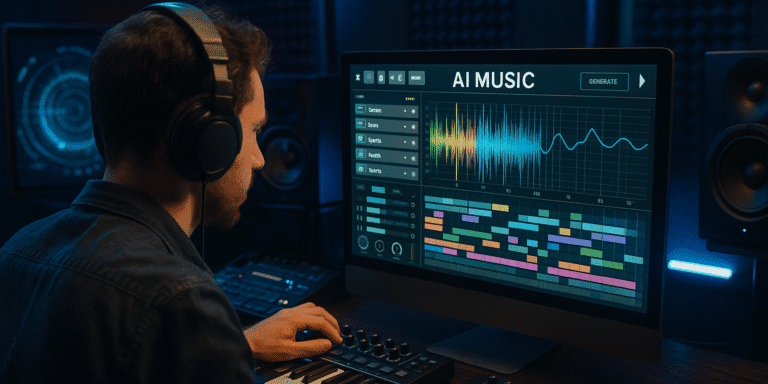Artificial Intelligence (AI) is no longer just a futuristic concept—it’s now reshaping how music is created, produced, and consumed. Tools like OpenAI’s Jukebox and Google’s Magenta are revolutionizing the music industry, offering artists the chance to experiment with new genres and styles. However, as AI becomes more embedded in music production, many are questioning its role: Is it a valuable creative partner, or does it threaten the authenticity and emotional depth of music?
AI-powered music tools are already having a significant impact. Musicians can now use AI to compose music, generate melodies, and even mimic the style of famous artists. While these innovations open up exciting possibilities, they also come with concerns about the future of music creation. Will AI enhance human creativity, or will it replace the emotional depth that defines great music?
AI as a Tool for Creativity
Many musicians see AI as a new collaborator rather than a competitor. Tools like OpenAI’s Jukebox, which can generate full-length songs, and Google’s Magenta, designed for music composition, are allowing musicians to break creative boundaries. Jukebox, for example, can produce music in the style of specific artists or mix genres in unique ways. This allows musicians to experiment with ideas they might not have considered otherwise.
Magenta’s machine-learning capabilities enable the automatic generation of melodies, harmonies, and rhythms, helping musicians discover new sounds. These tools provide fresh inspiration, enabling artists to explore unfamiliar territory in their compositions. For many, AI becomes a creative assistant, allowing them to focus more on their vision while leaving some of the technical aspects to the machine.
AI also helps artists overcome the technical challenges of music production, making the process faster and more efficient. Instead of spending hours perfecting a melody or experimenting with sounds, musicians can let AI generate different versions of a composition, providing more time for creative exploration. By taking on repetitive tasks, AI allows artists to be more imaginative and focused on their unique style.
Concerns About AI Replacing Human Musicians
Despite its creative potential, AI in music production raises concerns about authenticity and the role of human musicians. Critics argue that AI-generated music, though impressive, lacks the emotional depth that human composers infuse into their work. Music is often seen as an expression of human experience and emotion, which AI cannot replicate. While AI can mimic sounds and structures, it cannot convey the unique feelings or stories that define a song’s soul.
Moreover, some fear that the rise of AI could lead to job displacement within the music industry. As AI becomes more advanced, it could take over tasks traditionally performed by human musicians, producers, and sound engineers. There is a concern that this could lead to a loss of jobs in the industry, as machines may begin to replace the human touch in music creation.
AI could also flood the market with music, making it harder for individual artists to stand out. Since AI can generate large quantities of music quickly, some worry that the sheer volume of tracks could overwhelm listeners, causing the quality of music to decline. Additionally, with AI capable of producing music in any style or genre, it may become difficult for listeners to distinguish between human-created and machine-generated music.
Finding Balance: Collaboration Between Humans and AI
Despite these concerns, the role of AI in music creation is likely to grow. The key to success lies in balancing the innovative possibilities of AI with the emotional and authentic elements of human creativity. Rather than seeing AI as a threat, it should be embraced as a tool that can enhance the artistic process.
Many artists have already begun using AI in their music-making, combining traditional methods with new technologies to create something unique. For example, AI has been used to remix songs, generate experimental sounds, and even recreate the voices of artists who have passed away. These applications demonstrate how AI can serve as a complement to human creativity, rather than a replacement for it.
As AI continues to evolve, the music industry will need to adapt. Musicians must ensure that they remain in control of the creative process, using AI to assist rather than dominate. With the right approach, AI can open new doors for artistic expression without diminishing the personal touch that makes music meaningful.
The Future of Music Creation
AI’s growing presence in music creation suggests a future where human and machine work together to produce innovative and compelling music. While AI may never fully replicate the emotional depth of human musicianship, it offers exciting possibilities for creative exploration. In this new era, musicians and AI can coexist, enhancing each other’s strengths and pushing the boundaries of what’s possible in music.
For the music industry, the future lies in harnessing AI as a tool for innovation while ensuring that the artistry and soul of music remain intact. As technology continues to evolve, artists will need to navigate this new frontier carefully, ensuring that AI supports and enhances their creativity rather than replacing it.
Conclusion
AI is undeniably changing the landscape of music creation, offering new opportunities for innovation and collaboration. While there are valid concerns about the potential for AI to replace human creativity, the future of music likely involves a balance between human artistry and machine-assisted innovation. As AI technology evolves, it will be crucial for musicians and industry professionals to use it in ways that complement and enhance the creative process—keeping music human at its core while embracing the exciting possibilities of the future.


